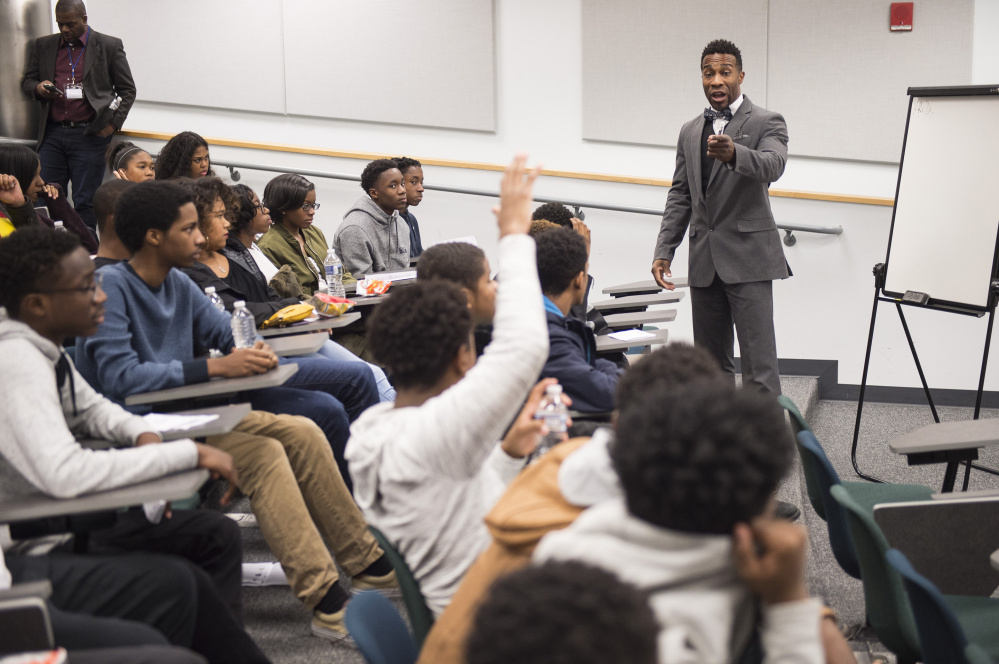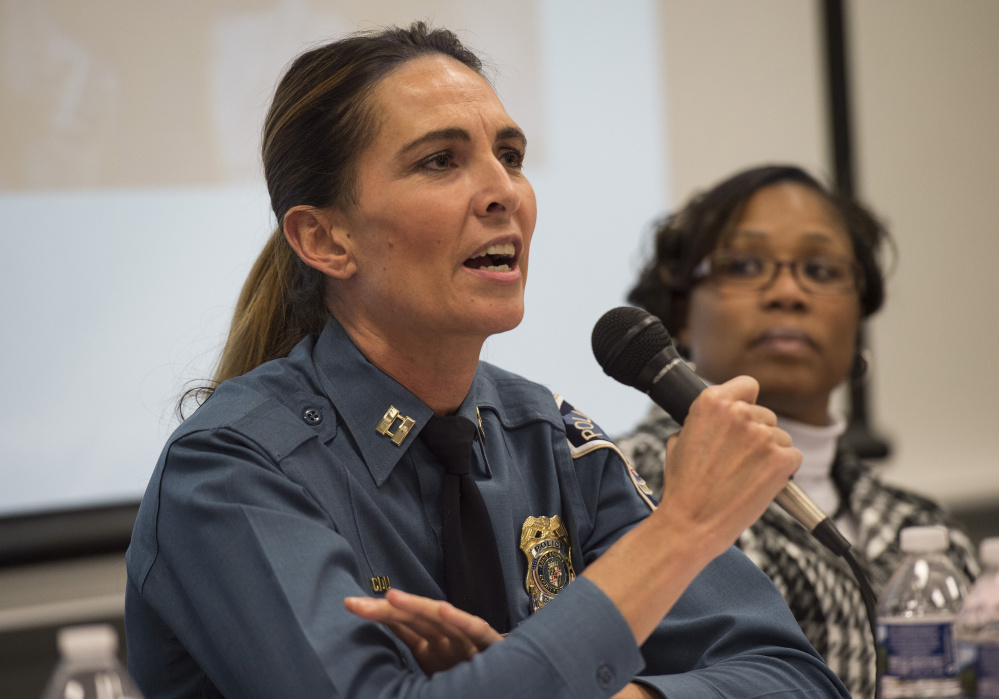HANOVER, Md. — The workshop title is simple, straightforward: “Race & the Law.”
The problems it seeks to address are anything but.
Capt. Katherine Goodwin, Western District commander of the Anne Arundel County Police Department, is the only white person in the room – part of a panel of experts leading the session – and she is the one who invites the question.
“Let’s hear from this young man in the middle,” Goodwin says.
“Hi, my name is Ezra,” the boy says. “I was wondering, can a police officer arrest another police officer?”
The room goes silent. A father multitasking his way through email on an iPad stops scrolling and stares.
It is a Saturday afternoon in early December, and Room 104 at the Anne Arundel Community College is packed, all 150 seats taken. There are moms with oversized Louis Vuitton bags from which they produce items such as granola bars and string cheese. But there are more fathers than mothers and a few elementary-school-aged kids. Most of all, there are teens with Beats headphones draped around their necks like electronic jewelry.
Organized by the Arundel Bay Area Chapter of Jack and Jill of America, “Race & the Law” was one of more than 225 similar events held throughout the country last year and more than 50 such events scheduled across the nation in the first three months of 2017; they are places where anxious black parents bring their children in hopes of preparing them for potentially fateful encounters with the police.
They are, in essence, mini boot camps for children about how to be black in 21st century America.
A STUNNING RISE IN SHOOTINGS
Jack and Jill is a family organization with more than 40,000 members. It aims to entertain and educate the kids of mostly middle-class and wealthy black families. It is an organization where kids are exposed to big experiences, such as lobbying on Capitol Hill and serving holiday food to the homeless, which do not look bad on college applications, either.
“All of these deaths, these unanswered questions about what police officers did or did not do, whether situations could have been handled a different way, have always been with us,” said Devin Tucker, a Jack and Jill father of two who brought his daughters, 14 and 10, to the Hanover event. “They are, however, coming at a frequency and a velocity now that I think no parent is really prepared for.”
As of Thursday, 957 people were shot and killed by police in 2016, according to an ongoing Washington Post investigation. Forty-one percent of them – 392 – were black or Latino. Together, the two groups compose 30.9 percent of the nation’s population. Black males continued to represent a disproportionate share of those: 34 percent of the unarmed people killed in 2016 were black males, although they are 6 percent of the population.
RACE AND POLICE WORKSHOPS SPREAD
From Baltimore to Ferguson, Missouri; Charlotte, North Carolina to Atlanta; and Houston to Oakland, California, there are now organized workshops about race and policing hosted by black churches, fraternities and sororities, and civic organizations. They carry names such as “The Law and Your Community” and “Surviving the Stop.”
Stephanie Irby Coard, an associate professor in human development and family studies at the University of North Carolina at Greensboro, says the existence of these events are an indication of the “anxiety and disappointment and anger so many black parents feel. Race continues to matter in dangerous ways. The difficult part is how to have these conversations in a way that is honest enough to maintain credibility.”
The workshops are an opportunity for parents to try to address two basic responsibilities of raising black children that often seem in conflict with each other: First, they would like to teach their children how to stand up for what is right, to speak out against what is wrong and to stand up for themselves. But they would also like to keep them safe and alive. For people of color, there is a long-standing worry that in encounters with police, one approach precludes the other.
“I am faced with a situation that you really cannot speak about and manage as a parent, as you feel that you should as a citizen,” Tucker said.
Keith Pemberton, a social worker from High Point, North Carolina, is a member of Omega Psi Phi, a historically black fraternity with more than 700 chapters worldwide, and the father of three boys, ages 11, 8 and 6.
“My wife and I really want to build into them a sense of possibility, of purpose. So it is beyond disheartening for me to also have to say, ‘Boys, no matter how you dress, speak or interact with someone, there is still that possibility that you are going to be treated like a savage.’ But that is where we are. That’s what a responsible father just has to do.”
TEACHING KIDS WHAT TO EXPECT
For many black and Latino children, interactions with the police are often a terrifying rite of passage.
“Unfortunately, particularly for black and Latino kids here in New York City, that’s an experience that is neither uncommon nor easy to forget,” said Lauren Frederico, director of Organizing Campaigns at the New York Civil Liberties Union, the New York chapter of the American Civil Liberties Union. “So our position at the ACLU is that knowing your rights is patriotic. Our goal has never been, we do not go into classrooms and say ‘all police are bad.’ But we do acknowledge reality.”
Frederico’s organization has offered workshops in and out of school called “Know Your Rights with Police” for protesters since the 1960s. But since at least 2000, they have also offered a kid-focused workshop on dealing with police officers in schools and on the streets. In the weeks since the presidential election, the number of requests from schools and community groups has risen from two or three each month to multiple requests each day.
The weekend before the 2016 presidential election, Omega Psi Phi hosted a “community forum” at the Charlotte Convention Center aimed at addressing “the killings of African-American men.”
The bottom-line advice to those men came down to this: Total compliance and acquiescence, even if the orders, accusations or suspicions make no sense or violate your rights. Come home alive, file a complaint later and fight by seeing that process through.
A group of women distributed free copies of a $9.99 book called “A Survival Guide: How Not to Get Killed by the Police, Part I.” It was written by M. Quentin Williams, a former FBI agent, lawyer and onetime executive with the National Football League and National Basketball Association.
Pemberton, the father of three, took four copies.
FOR MILD RESISTANCE, WHY DEATH?
In Charlotte, while the admonition to be very cooperative prompts some resigned nods of acknowledgment, not everyone agreed.
“I, for one, refuse to blame all the black and brown people injured and killed for all of these outcomes,” said Benjamin Crump, a Florida lawyer and past president of the National Bar Association, a historically black lawyers group.
“We have a racist justice system, or certainly one that is not free of bias,” Crump said. “We know that. We do ourselves no favors when we deny that. The question should be, why is the penalty for asking questions, for – I don’t know – actually talking back, for raising your hands, for keeping your hands down, you name it, so often, for our children and young people, death?”
Crump elicited a long round of applause from the audience of more than 200. His clients include the family of Trayvon Martin, 17, who was killed in 2012 by George Zimmerman, a private citizen engaged in what Crump described as self-assigned, neighborhood-watch activities. Zimmerman was acquitted in the killing after his defense argued that the unarmed teen represented a grave threat to Zimmerman.
A BOY’S QUESTION On EQUALITY
Back in Room 104, Ezra is waiting for an answer. “Can a police officer arrest another police officer?”
Capt. Goodwin seems visibly nervous. She has been with Anne Arundel’s police department since 1994. She has worked in intelligence and homeland security, criminal investigations, sex crimes and as patrol commander for two districts. She led the department’s training academy.
Ezra is asking, in his own way, about one of the fundamentals of the American ideal – equality under the law.
Goodwin explained about the year-long screening process for potential officers, the training, and she mentioned the “rare bad apple” officer.
Then she said: “The answer is yes. When all of that fails and police officers break the law, when police officers are bad and we have proof, we will arrest them. We can do that. We have to do that. We absolutely do.”
Send questions/comments to the editors.




Comments are no longer available on this story